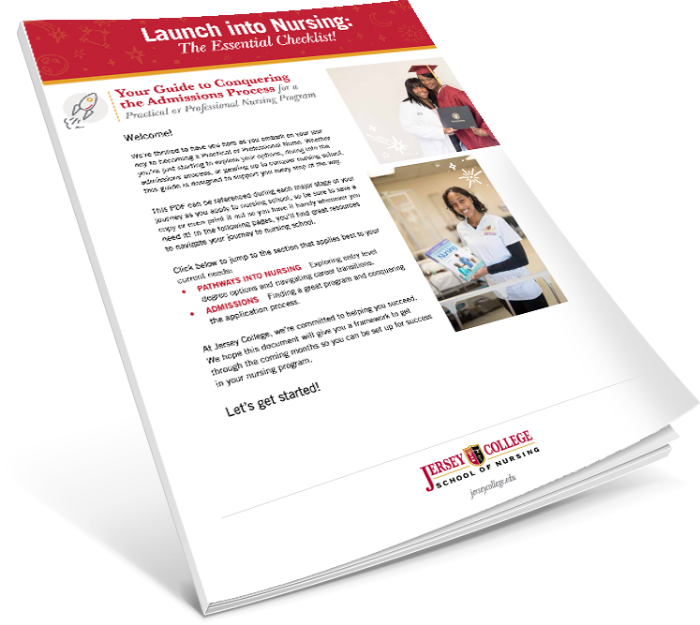
Exploring Different Nursing Career Paths
Travel Nursing
Travel nursing offers nurses short-term assignments in different locations, perfect for those who enjoy change and adventure.
It involves filling in during staffing shortages and requires quick adaptation to new environments and teams. Benefits can include the opportunity to travel, gain varied clinical experience, competitive pay, and housing allowances.
To start a career in travel nursing, nurses typically need a few years of experience. Those with a Practical Nursing (PN) diploma or an Associate Degree in Nursing (ADN) may be qualified for this path. Travel nursing agencies can help find assignments and handle moving logistics.
Overall, travel nursing is a dynamic choice for nurses seeking variety and professional growth in different healthcare settings.

FREE Essential Guide to Nursing School: Get Accepted, Survive, and Thrive!
Telehealth Nursing
Telehealth is a growing sector in healthcare, focusing on providing care remotely through technology.
This field is vital for reaching patients in remote areas or with limited mobility. Nurses in a telehealth role use phone or video calls to consult with patients, offer care advice, and sometimes monitor health remotely. Technological proficiency is key in this role, as nurses must navigate various digital platforms effectively.
To pursue a career in telehealth nursing, foundational nursing education—such as a PN diploma or an ADN—is essential. Nurses typically start with traditional clinical experience before transitioning to telehealth. Additional training in telehealth technology and patient communication is often required.
This field is suited for nurses who are comfortable with technology and are interested in an innovative approach to patient care. Telehealth nursing not only expands a nurse’s skill set but also plays a crucial role in modernizing patient care delivery.
Nursing Specialties
Nursing offers a variety of specialties, each with unique roles and requirements.
To enter these specialties, nurses generally start with a foundational education, like a Practical Nursing (PN) diploma or an Associate Degree in Nursing (ADN). From there, gaining experience in general nursing and pursuing specialized training or certifications paves the way to these focused career paths.
Pediatric Nursing
Pediatric nurses specialize in caring for infants, children, and adolescents. They manage routine health examinations, immunizations, and common childhood illnesses. Skills in communicating with children and their families are crucial.
To become a pediatric nurse, one usually starts with a nursing degree, gains experience in general nursing, and may pursue additional certifications in pediatric care.
Learn more about becoming a pediatric nurse from the Society of Pediatric Nurses.
Emergency Nursing
Emergency nurses work in a fast-paced environment, dealing with a wide range of medical emergencies. They need to be quick-thinking, resilient, and skilled in handling critical situations.
Becoming an emergency nurse involves obtaining a nursing degree, followed by gaining experience in an emergency or intensive care unit, and often additional certification in emergency nursing.
Learn more about how to join the emergency nursing field from the Emergency Nurses Association.
Oncology Nursing
Oncology nurses care for cancer patients, administering treatments like chemotherapy, managing symptoms, and providing emotional support. They need specialized knowledge in cancer care and strong empathetic communication skills.
Nurses enter this field by first completing their nursing education, gaining clinical experience, and then obtaining oncology nursing certifications.
Learn more about the oncology nursing specialty from the Oncology Nursing Society.
Psychiatric Nursing
Psychiatric nurses focus on mental health care, supporting patients with mental illnesses or disorders. They provide therapy, administer medications, and develop treatment plans. Strong communication and empathy skills are essential.
Aspiring psychiatric nurses complete their nursing degree, gain experience in mental health settings, and may pursue further specialization through certifications or advanced degrees.
Each of these specialties requires dedicated training and a deep understanding of the specific needs of the patient populations they serve, making nursing a field rich with diverse and fulfilling career paths.
Find out more about psychiatric-mental health nursing from the American Psychiatric Nurses Association.

Sign up to get new articles in your inbox and stay updated on our nursing programs.
Beyond Bedside Care: Advanced Nursing Roles
Advanced nursing roles offer opportunities beyond traditional bedside care to climb the nursing career ladder, focusing on specialized areas of healthcare.
To enter these advanced positions, nurses typically need a Bachelor of Science in Nursing (BSN) as a starting point, followed by a Master’s or Doctoral degree in their chosen specialty. Gaining experience in the nursing field and obtaining additional certifications specific to their specialty area are also crucial steps.
Nurse Practitioner
Nurse Practitioners (NPs) are advanced practice registered nurses who provide a blend of nursing and healthcare services. They can perform physical exams, diagnose illnesses, prescribe medications, and develop treatment plans. NPs often work independently or in collaboration with physicians, and they play a crucial role in providing accessible healthcare, especially in primary care and family medicine.
To become an NP, nurses must complete a Master’s or Doctoral program in nursing, pass a national certification exam, and obtain a state license. Learn more from the American Association of Nurse Practitioners (AANP).
Clinical Nurse Specialist
Clinical Nurse Specialists (CNSs) are expert clinicians in a specialized area of nursing practice, such as pediatrics, geriatrics, or oncology. They not only provide direct patient care, but also lead initiatives to improve healthcare delivery and outcomes. CNSs often act as consultants, helping to educate and guide other nurses.
Becoming a CNS involves obtaining a Master’s or Doctoral degree in a specific clinical nursing specialty, gaining clinical experience, and achieving certification in that specialty area. Learn more from the National Association of Clinical Nurse Specialists (NACNS).
Nurse Anesthetist
Certified Registered Nurse Anesthetists (CRNAs) specialize in administering anesthesia and providing care before, during, and after surgical or diagnostic procedures. They are vital in ensuring patient safety and comfort during these procedures.
To become a CRNA, a nurse must complete a Master’s or Doctoral degree in nurse anesthesia, have significant experience in critical care nursing, and pass a national certification exam. Learn more about how to become a CRNA from the American Association of Nurse Anesthesiology.
Each of these advanced roles reflects the diverse and integral contributions of nursing professionals in various healthcare settings. They offer nurses opportunities to deepen their expertise, take on leadership roles, and significantly impact patient care and healthcare outcomes.
Nursing's Broader Impact on Healthcare
Nursing significantly shapes the healthcare system beyond direct patient care. Nurses, with their firsthand experience, are uniquely positioned to advocate for patient-centered care and influence health policy. Their insights into patient needs and system inefficiencies drive improvements in care quality and accessibility. This frontline perspective is crucial in policy-making, leading to more effective and patient-friendly healthcare solutions.
In specialized roles like nurse practitioners, clinical nurse specialists, and nurse anesthetists, nurses directly impact patient care practices. They combine clinical expertise with patient insights, playing key roles in developing and implementing evidence-based care protocols. These advanced practitioners lead initiatives to enhance patient outcomes, safety, and streamline care processes, demonstrating the critical role of nursing in clinical practice development.
Nurses are also pivotal in public health and community education. Their involvement in health crises, disease prevention, and wellness promotion extends healthcare's reach into communities. Through public health initiatives and research, nurses contribute to long-term community health, disease management, and the advancement of healthcare knowledge, showcasing the expansive influence of nursing in healthcare.
Related Resources
- The Different Types of Nursing Degrees
- Nursing Salary Guide
- Nursing Degrees Guide
- How to Become an RN
- How to Become an LPN
- Transitioning from a CNA to an RN
- Transitioning from a Paramedic to an RN
- Transitioning from a Military Medic to an RN
- Associate’s Degree in Nursing (ADN) vs. Bachelor’s Degree in Nursing (BSN)
Find Your Campus
Based on the success of our programs, we have grown to serve communities in 7 states (and counting!). Find a campus near you to start your NurseLife.

FREE Essential Guide to Nursing School: Get Accepted, Survive, and Thrive!
